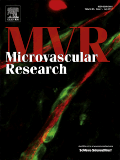
MICROVASCULAR RESEARCH
Scope & Guideline
Illuminating the Pathways of Microvascular Biology
Introduction
Aims and Scopes
- Microvascular Function and Dysfunction:
The journal extensively covers studies related to the assessment of microvascular function and dysfunction, including innovative techniques like laser Doppler flowmetry, nailfold capillaroscopy, and optical coherence tomography angiography. - Endothelial Biology:
Research on endothelial cells, their role in vascular health, and their responses to various stimuli, including shear stress, inflammation, and hypoxia, is a core focus area. - Pathophysiology of Vascular Diseases:
The journal includes studies investigating the pathophysiological mechanisms of various vascular diseases, such as diabetes, hypertension, and coronary artery disease, highlighting the microvascular implications. - Angiogenesis and Vascular Remodeling:
Research on angiogenesis, including the mechanisms regulating new blood vessel formation and remodeling in response to injury or disease, is a significant aspect of the journal's scope. - Innovative Therapeutic Approaches:
The journal publishes research on new therapeutic strategies targeting microvascular dysfunction, including pharmacological, nutritional, and exercise interventions. - Technological Advancements:
An emphasis on the development and application of novel imaging and analytical techniques to study microvascular structures and functions. - Clinical Implications:
The journal aims to bridge the gap between laboratory research and clinical practice by addressing how microvascular research can inform treatment strategies for a variety of conditions.
Trending and Emerging
- Impact of COVID-19 on Microvascular Health:
A significant increase in studies examining the effects of COVID-19 on microvascular function reflects a growing recognition of the virus's implications for vascular health. - Microbiota and Vascular Health:
Research exploring the gut microbiota's influence on microvascular function and diseases is emerging, underscoring the interconnectedness of systemic health and endothelial function. - Sex Differences in Microvascular Function:
There is a rising interest in understanding how sex differences affect microvascular function and responses, which may lead to more personalized approaches in treatment. - Nanotechnology in Vascular Therapies:
The application of nanotechnology for targeted therapies and drug delivery systems in vascular diseases is gaining momentum, indicating a trend towards innovative therapeutic strategies. - Chronic Disease Management:
Recent publications emphasize the role of microvascular health in chronic diseases such as diabetes and obesity, reflecting an emerging focus on long-term management strategies. - Psychosocial Factors and Microvascular Function:
There is an increasing recognition of the impact of psychosocial factors, including stress and mental health, on microvascular function and overall vascular health.
Declining or Waning
- Basic Mechanistic Studies:
There seems to be a decreasing focus on purely mechanistic studies exploring vascular biology without direct clinical implications, as the field moves towards more translational research. - Historical Reviews and Meta-Analyses:
The frequency of publications centered on historical reviews or broad meta-analyses appears to be diminishing, with a shift towards original research and novel experimental studies. - Non-invasive Measurement Techniques:
Although non-invasive measurement techniques were once a significant focus, there has been a noticeable decline in studies utilizing traditional methods, as newer imaging technologies gain traction. - Animal Models in Microvascular Research:
The reliance on animal models is declining as researchers increasingly seek human-relevant studies, particularly in the context of translational research. - Generalized Vascular Studies:
Research that broadly examines vascular function without a specific focus on microvascular implications is becoming less common, indicating a more targeted approach to microvascular research.
Similar Journals
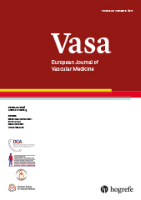
Vasa-European Journal of Vascular Medicine
Advancing Vascular Knowledge for Healthier FuturesVasa - European Journal of Vascular Medicine is a leading peer-reviewed journal dedicated to advancing the field of vascular medicine, published by HOGREFE AG in Switzerland. With a proud history dating back to 1972, this journal serves as a critical platform for researchers, clinicians, and healthcare professionals committed to enhancing knowledge and practice related to cardiovascular health and vascular disorders. Holding a notable Q2 ranking in the cardiology and cardiovascular medicine category, Vasa’s scholarly contributions reflect high-quality research and innovative insights that drive clinical applications. The journal provides essential access to original articles, reviews, and case studies, fostering a vibrant exchange of ideas within the vascular medicine community. Its Scopus rank of #159 out of 387 further underscores its impact, placing it confidently in the 59th percentile among its peers. Vasa is synonymous with rigorous academic standards and relevance, making it an invaluable resource for anyone seeking to stay at the forefront of vascular research and its clinical implications.

Indian Journal of Vascular and Endovascular Surgery
Elevating Clinical Practices in Endovascular CareThe Indian Journal of Vascular and Endovascular Surgery, published by Wolters Kluwer Medknow Publications, serves as a premier platform dedicated to advancing research and clinical practices in the fields of vascular and endovascular surgery. With an E-ISSN of 2394-0999 and a commitment to open access since 2015, this journal provides invaluable insights to researchers, professionals, and students alike, fostering a collaborative environment for the dissemination of knowledge. By focusing on innovative techniques, case studies, and systematic reviews, the journal plays a vital role in enhancing clinical outcomes and promoting evidence-based practices within the vascular community. Its commitment to high-quality research and accessibility positions it as an essential resource in the landscape of surgical literature, encouraging further exploration and collaboration within this critical area of healthcare.
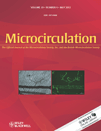
MICROCIRCULATION
Pioneering Discoveries in Health and DiseaseMICROCIRCULATION, published by WILEY, is a leading journal dedicated to the exploration of microcirculatory processes in health and disease. With an ISSN of 1073-9688 and E-ISSN 1549-8719, this journal has been a vital resource in the fields of cardiology, molecular biology, and physiology since its convergence in the early 1980s. Given its impressive impact factor within its quartile rankings—Q2 in Cardiology and Cardiovascular Medicine, and Q3 in several other categories—MICROCIRCULATION is positioned as an influential platform for researchers and clinicians interested in the intricacies of microvascular function. While it is not an open-access journal, the research published here contributes significantly to the body of knowledge regarding microvascular health, cardiovascular adaptations, and related molecular mechanisms, appealing to a broad spectrum of academics and medical professionals committed to advancing their understanding in this critical area. Explore the breakthroughs and insights presented in MICROCIRCULATION and stay at the forefront of ongoing research and discussions.

Cardiovascular Diabetology
Pioneering Insights in Cardiovascular Health and Diabetes ManagementCardiovascular Diabetology is a prestigious open-access journal published by BMC, focusing on the intersecting fields of cardiology, endocrinology, diabetes, and internal medicine. Since its inception in 2002, this journal has established itself as a vital resource for researchers, clinicians, and academics dedicated to advancing knowledge in these areas. With an impressive impact factor reflected in its Q1 rankings for the year 2023 across its respective categories, including a ranking of 22nd in Cardiology and Cardiovascular Medicine and notably 15th in Internal Medicine, it positions itself at the forefront of scholarly communication. The journal encourages the dissemination and sharing of groundbreaking research, providing open access to foster engagement and collaboration among professionals globally. As it converges from 2002 to 2024, Cardiovascular Diabetology continues to be a pivotal platform for innovative studies, reviews, and critical insights that significantly impact clinical practices and medical education in the evolving landscape of cardiovascular health and diabetes management.

ARTERIOSCLEROSIS THROMBOSIS AND VASCULAR BIOLOGY
Pioneering insights into thrombosis and vascular disorders.ARTERIOSCLEROSIS THROMBOSIS AND VASCULAR BIOLOGY, published by Lippincott Williams & Wilkins, is a leading journal in the field of cardiovascular medicine, dedicated to the advancement of research surrounding arterial diseases, thrombosis, and vascular biology. With an impressive impact factor indicative of its reach and influence, this journal occupies a prominent position in the Q1 category of cardiology, ranking 13th out of 387 in its field according to Scopus, placing it within the top 96th percentile among cardiovascular research journals. Since its inception in 1990, ARTERIOSCLEROSIS THROMBOSIS AND VASCULAR BIOLOGY has been pivotal in disseminating cutting-edge research that drives innovation and education in cardiovascular health. Although it does not operate under an open access model, the journal is a vital resource for researchers, clinicians, and students looking for high-quality, peer-reviewed articles that contribute to the understanding and treatment of cardiovascular and vascular disorders. Its commitment to rigorous scientific standards and its focus on impactful findings make it an essential publication for anyone dedicated to the field.

BIORHEOLOGY
Advancing Insights into Biological Fluid DynamicsBIORHEOLOGY is a peer-reviewed journal published by IOS PRESS, dedicated to the interdisciplinary field of biorheology, which studies the flow properties of biological fluids and the mechanical behavior of biological tissues. With its ISSN 0006-355X and e-ISSN 1878-5034, this journal has been a vital source of scientific knowledge since its inception in 1965, with coverage extending to recent years and into 2024. As a respected publication within the realms of physiology and biochemistry, it is classified in Q4 in both Physiology and Medical Physiology categories as of 2023, showcasing its niche position within the academic community. The journal primarily aims to disseminate research findings that advance our understanding of biorheological principles and their applications in medicine and biology. Although not listed as open access, BIORHEOLOGY provides essential insights to researchers, professionals, and students eager to explore the complexities of fluid mechanics in biological systems, making it a valuable resource for fostering innovation and collaboration across scientific disciplines.

BMC Ophthalmology
Fostering Global Collaboration in Vision ScienceBMC Ophthalmology is a premier open access journal dedicated to advancing the field of ophthalmology through the publication of high-quality, peer-reviewed research. Published by BMC in the United Kingdom, this journal has been a vital resource since its inception in 2001 and continuously contributes to the global dialogue in vision science. With an impact factor reflecting its growing influence, BMC Ophthalmology is ranked among the top quartiles (Q2) in both general medicine and ophthalmology, emphasizing its significance in medical research. The journal encourages submissions that explore innovative diagnostics, treatment approaches, and understandings of various ocular diseases, thereby appealing to researchers, clinicians, and students alike. As an open access platform, it ensures that cutting-edge research is not only published but also readily accessible to a worldwide audience, promoting further study and collaboration in this essential area of medicine.
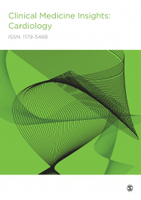
Clinical Medicine Insights-Cardiology
Transforming Cardiovascular Care Through Insightful ResearchClinical Medicine Insights-Cardiology is a prestigious open-access journal published by SAGE Publications Ltd, focusing on cutting-edge research in the field of cardiology and cardiovascular medicine. With the ever-evolving landscape of cardiovascular health, this journal serves as a vital platform for disseminating significant findings, clinical practices, and innovative therapies. Established in 2007, it has rapidly gained recognition, currently ranked in the Q2 category for cardiology, positioned at #112 out of 387 in Scopus Rankings, and boasting a commendable 71st percentile. The journal not only emphasizes the integration of recent advancements in clinical and laboratory studies but also aims to bridge the gap between research and practice, making it an essential resource for researchers, healthcare professionals, and students alike. Situated in New Zealand and operating with an open-access model, Clinical Medicine Insights-Cardiology promotes the unrestricted dissemination of knowledge, ensuring that critical insights into cardiovascular medicine are accessible globally.
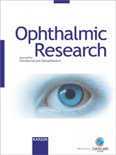
OPHTHALMIC RESEARCH
Illuminating Insights in Ophthalmology and NeuroscienceOphthalmic Research, with ISSN 0030-3747 and E-ISSN 1423-0259, is a distinguished peer-reviewed journal published by Karger in Switzerland. Established in 1970, this journal serves as a vital resource for exploration and dissemination of knowledge within the fields of Ophthalmology, Cellular and Molecular Neuroscience, and Sensory Systems, maintaining its relevance through its convergence into modern research methodologies leading up to 2024. With impressive rankings in 2023, it holds a Q2 quartile in both Ophthalmology and Medicine (miscellaneous), reflecting its significant contribution to the academic community, alongside Scopus ranks that position it favorably in the competitive landscape of medical and neuroscientific literature. Although not open access, the journal ensures that high-quality research remains accessible to its readership, which includes researchers, professionals, and students eager to stay at the forefront of ophthalmic advancements. By fostering interdisciplinary collaboration and facilitating high-level discourse, Ophthalmic Research is pivotal for those committed to advancing the future of eye care and vision sciences.

Current Opinion in Physiology
Advancing Insights in the Dynamic World of PhysiologyCurrent Opinion in Physiology, published by Elsevier, is a leading journal dedicated to the dynamic field of physiology. With an E-ISSN of 2468-8673, this journal provides a platform for the latest insights and perspectives, reflecting the evolving landscape of physiological research. Operating from the United Kingdom, the journal holds a respectable impact factor and is ranked Q2 in both general physiology and medical physiology categories, highlighting its prominence among the global academic community. With Scopus rankings placing it in the 64th and 60th percentiles within its respective categories, Current Opinion in Physiology serves as an essential resource for researchers, professionals, and students eager to stay informed about innovative theories and emerging trends in physiology. The publication emphasizes high-quality reviews that summarize current knowledge and future directions, ensuring readers gain valuable insights applicable in both clinical and research settings.